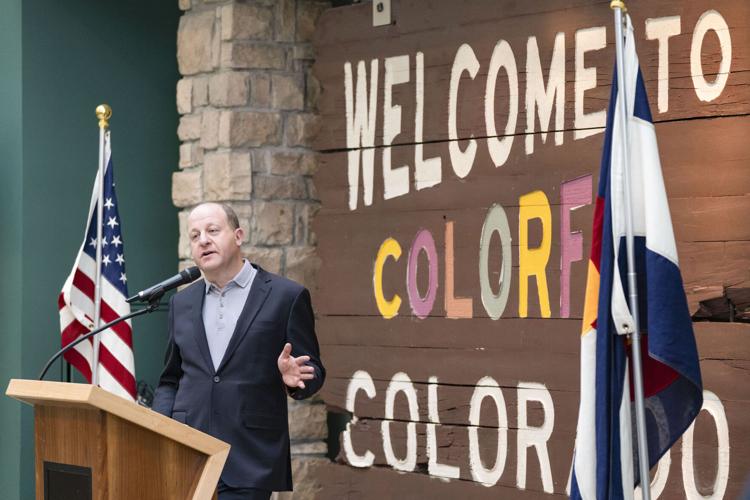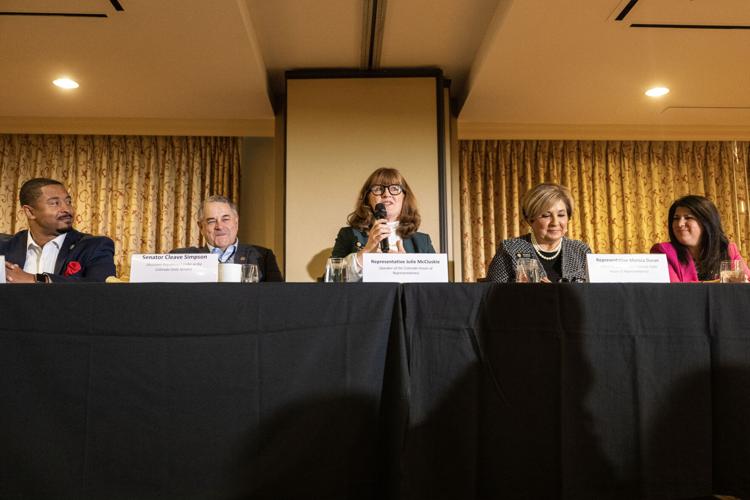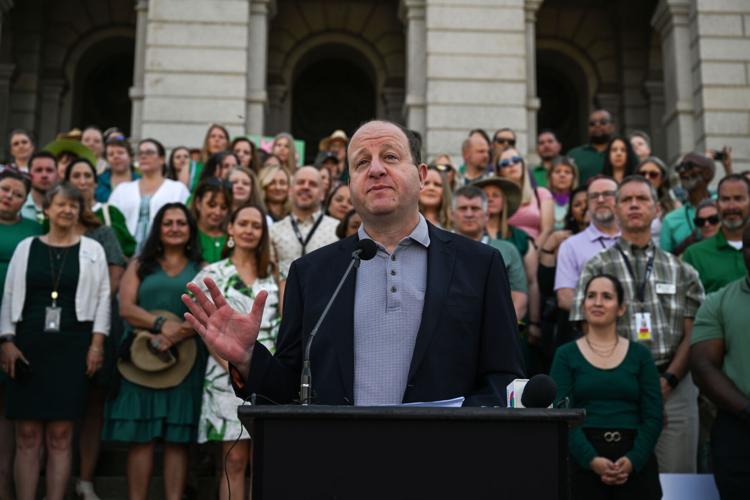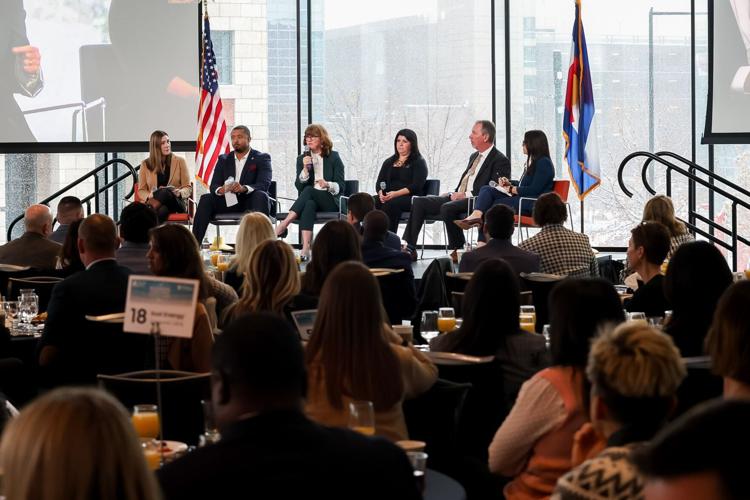Colorado governor, legislators have yet to agree how to plug $800M deficit | ANALYSIS
Colorado legislators will convene at the state Capitol in about two weeks without first having secured a deal — with the governor or among themselves — outlining how to plug an $800 million budget deficit, which means the upcoming special session could be more open-ended and the fiscal prescriptions, whatever they may be, less defined.
An agreement might materialize between now and the special session later this month, as policymakers scramble to line up ideas on how or where to cut the state budget.
Gov. Jared Polis said his proclamation a few days ago set the parameters of what the legislators will discuss — but it will be up to the latter to decide the details of the fiscal remedy.
“The legislators decide what bills to pass and what to do, and the specifics,” Polis said in an interview last week.
Lawmakers, he said, will also need to decide how long the session will last.
It’s not unusual for the governor’s office and legislative leaders to have already secured an agreement before convening a special session. In practice, this means rejecting any other measure that is not part of the compromise. That, in turn, means a short special session — often no more than three or four days, just the time needed to abide by the constitutional requirements of passing legislation.
That’s what occurred in August of last year, when Colorado lawmakers adopted a deal that reduced the assessment rates for residential and commercial properties and limited the revenue growth for local governments and school districts. The governor and legislative leaders had struck a an agreement with two groups behind a pair of ballot measures that sought property tax cuts deeper than what already policymakers enacted earlier that year.
After legislators passed that deal, the two groups promptly withdrew their ballot measures.
This time around, legislative leaders confirmed they have yet to figure out how to cut $783 million from the budget, though they and the governor have a clear idea about which funding not to touch.
They said education funding will be spared from any cuts. So is money for public safety.
“We’re getting our arms around the call right now,” House Speaker Julie McCluskie said in the same interview with the governor last week. At that time, she said Democratic and Republican leaders will meet to “set the terms of the special session,” as defined by the governor’s call.
McCluskie also said all 100 legislators of the Colorado General Assembly will “have the opportunity to bring forward bills.”
“We’ve got a lot of work ahead of us, for sure,” she said.
McCluskie said legislators have begun conversations with the governor’s office and with different groups worried about the impact of any cuts to state programs.
The special session is slated to start on Aug. 21, with policymakers insisting it’s better to deal with the shortfall now, as it will allow state agencies to absorb cuts over a 10-month period, rather than wait until early next year, when budget adjustments are typically made.
Additionally, the special session will deal with artificial intelligence regulation, reinsurance, the new federal prohibition against reimbursing clinics for health care programs if they also offer abortion services, and using some of the dollars for the state’s school meals program to pay for food stamps.
Policymakers are mindful of the optics of decisions to cut hundreds of millions of dollars from the budget — after they’ve already reduced spending for programs to also deal with a $1 billion budget deficit in the current spending plan.
Already, both sides of the ideological aisle have begun to define what the special session means politically.
The governor, along with Democrats, pointed to federal tax policy changes as the “sole” reason behind Colorado’s current deficit. Republicans, on the other hand, have argued that legislators knew a large deficit was coming and still decided to grow government spending.
Indeed, Democrats argued that the legislature approved a balanced budget before Congress approved its spending plan and that Colorado residents were slated to receive a Taxpayer’s Bill of Rights (TABOR) surplus — which the Trump administration undid, they said, by signing the congressional budget.
“We didn’t even know if Congress was going to pass H.R. 1. So, it’s kind of absurd to say that we should have had some kind of crystal ball and known what was happening,” Polis said, when pressed about arguments that the Democratic-led legislature knew long before that a deficit was looming on the horizon and lawmakers — meaning the ruling party in Colorado — are to be blamed for the fiscal predicament the state is in.
“We balanced our budget in May, right?” added Senate President James Coleman. “What we’re responding to is what happened at the federal level.”
“We don’t control what happens in DC. And to be clear, this is a GOP bill that was passed,” Coleman said.
House Republicans, meanwhile, criticized the special session as a waste of taxpayer money and argued that Colorado’s budget deficit is “self-inflicted.”
House Minority Leader Rose Pugliese of Colorado Springs said Polis “is using a special session to stir fear about the Big Beautiful Bill, when the truth is that the Big Beautiful Bill continues to cover the people it was designed to serve: seniors, single mothers, children, and people with disabilities.”
Republicans also insisted that the budget deficit is the result of the Democratic-led legislature’s own actions, arguing the state built unsustainable programs with one-time federal dollars, instead of setting priorities for core services, such as Medicaid for seniors, single moms, children and people with disabilities.
“The Democrats’ obsessive and irresponsible spending has forced this legislature to operate under a structural deficit for years. This crisis is entirely self-inflicted, not because of H.R.1, but because of the Democrats’ mismatched priorities,” Senate Minority Leader Sen. Cleave Simpson, R-Alamosa, earlier said.
Battle lines have also begun to take shape outside of the state Capitol, with arguments that are likely to get deployed in the elections next year.
Shad Murib, chair of the Colorado Democratic Party, blamed the four Republican members of the state’s congressional delegation for residents not getting a TABOR refund.
“TABOR robs CO of fully funded schools, great roads, and good services — literally the only redeeming quality people experience w/ TABOR are refunds, and now @repgabeevans, @RepJeffHurd, @laurenboebert and @RepJeffCrank took those away from you,” he said on X, referring to the Republican members.
“This is a blatant lie,” responded Michael Fields of Advance Colorado. “Before the federal bill passed, there wasn’t even enough money to cover the senior homestead exemption, which meant no TABOR refunds for anyone. Democrats blew the entire $3.6 billion surplus, where we all got $750 refunds checks 3 years ago – and are now lying about who’s to blame.”
Marianne Goodland contributed to this article.









